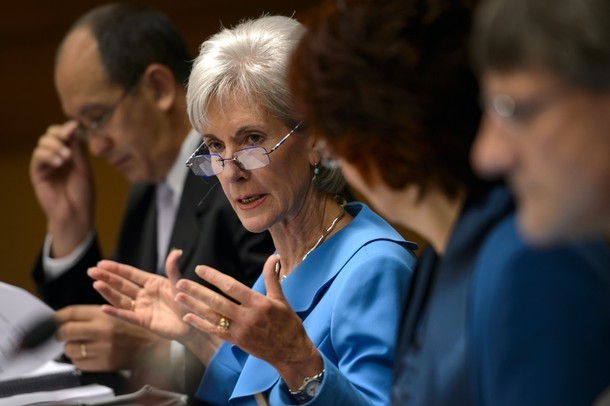In response to the Obama administration’s federal contraceptive mandate, 43 religious institutions have now filed 12 lawsuits against the U.S. Department of Health and Human Services, claiming the mandate violates their religious liberties.
The mandate, put in place by a provision in President Obama’s health care law, requires employers to provide access to insurance coverage of “preventative” services at no direct cost to employees. In February, HHS Secretary Kathleen Sebelius shocked religious institutions when she announced these services must include abortifacients, sterilization, and contraceptives.
Michigan was the first state to file suit against HHS over the mandate, claiming infringement of religious liberties in a lawsuit joined by attorneys general from Nebraska, Ohio, Oklahoma, South Carolina, Florida, and Texas. The additional lawsuits include 13 Catholic dioceses, several Catholic health care organizations and charities, and several Catholic colleges and universities including the University of Notre Dame.
These suits, filed in federal court districts in New York, Pennsylvania, Ohio, Indiana, Illinois, Missouri, Mississippi, Texas, and Washington, DC, allege Sebelius’s mandate requires coverage of “drugs and procedures in direct conflict with their religious beliefs,” according to press releases from the plaintiffs.
Conference of Bishops May Join
The United States Conference of Catholic Bishops (USCCB) has also spoken out, suggesting it may join a suit if the administration does not reverse the mandate.
Though there has been criticism of the lawsuits as an extreme step, Sr. Mary Ann Walsh, spokeswoman for USCCB, notes other avenues have produced no progress.
“The threat to religious freedom still exists.… Other avenues of redress, at the executive and legislative level, have so far proven inadequate,” Walsh said. “With the mandate going into effect in August for most employers, time is running out for those concerned about being forced to violate their conscience.”
First Amendment Freedoms at Issue
For USCCB and the institutions filing suit, the legal issue is not abortion or contraception but the right of all individuals to live in a way consistent with their moral convictions, without government intrusion or restraint, says Preston Noell, director of the office of the public liaison at the the American Society for the Defense of Tradition, Family, and Property.
“This is an assault on our religious liberty, not just for Catholics but all Americans. Making this about contraception or abortion is simply an attempt to distract from the real issue,” Noell said.
Noell says the 43 organizations engaging in these lawsuits are a good start, adding he’d prefer to see private, non-religiously affiliated employers joining in objecting to the mandate. He says he expects such opposition to increase if the mandate goes into effect unchanged in August.
Service Vs. Conscience
The lawsuits now include several organizations that provide care to the poor and destitute. Service remains at the core of the Catholic Church, Walsh says, but there is a dividing line where providing such service conflicts with faith.
“The Catholic Church has promoted women’s health throughout its history. The Church does not and cannot legally prohibit women from using contraception,” Walsh said. “It strenuously objects, however, to its being coerced to pay for and facilitate drugs and surgeries that violate its teaching. Given the current situation of widely and cheaply available contraception, the government cannot claim a compelling reason to require this violation.”
Walsh says the Obama administration continues to argue it is simply looking for a suitable way to respect religious freedom while providing crucial health services for women, but this isn’t what it has accomplished.
“It is interesting that this new government effort to promote ‘women’s health’ centers on women ingesting drugs and undergoing surgeries that can have significant risks—no male methods for preventing pregnancy are covered,” Walsh said.
Universities Drop Coverage
Institutions of higher education have an additional choice to make: whether to provide health insurance coverage for their students. In May the Franciscan University of Steubenville—a party to the lawsuit in Ohio—decided it was necessary to end its health insurance program for students rather than abide by the HHS mandate.
The program covered approximately 200 students over the last academic year, and coverage cost approximately $100,000, according to Franciscan vice president of advancement Mike Hernon. If the university continued the program, the federal requirement would have increased the cost to $500,000 for the next school year.
“The two factors that are driving our decision are the freedom of religion and the economics. We don’t feel it’s fair to pass that cost on to our students,” said Hernon.
Franciscan said it will continue to offer coverage for its employees but will not abide by the mandate to cover the required preventative services.
Redefining Religious Institutions
Whether the Obama administration will respond to these lawsuits by working to address religious liberty concerns remains to be seen, but Walsh is hopeful the administration will make the necessary strides toward a solution.
“A big step would be for the administration to move away from defining what constitutes a religious ministry and exempt the full range of those who have a religious objection to the mandate,” said Walsh.
She maintains the government’s current definition of a religious ministry is inaccurately limited.
“Never before has the federal government suggested such a miserly definition of a religious ministry as it does in the new health care law. The government says an organization can only be considered a religious employer if it primarily hires its co-religionists and serves its co-religionists,” Walsh said. “The ministry of Jesus Himself doesn’t pass the government’s new test of ‘religious-enough.'”





